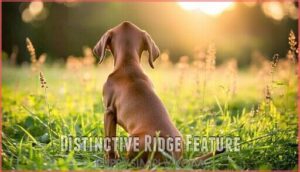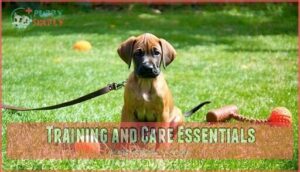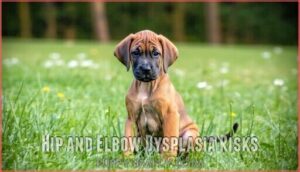This site is supported by our readers. We may earn a commission, at no cost to you, if you purchase through links.

These athletic pups grow into 70-85 pound guardians with distinctive spinal ridges and wheaten coats. They’re fiercely loyal but strong-willed, requiring early socialization and consistent training.
Watch for hip dysplasia (25.2% risk) and dermoid sinus (2.5-5.3% risk). Their 10-12 year lifespan demands daily exercise and mental challenges.
From protective instincts to grooming needs, understanding these facts about the Rhodesian Ridgeback puppy shapes successful ownership. The ridge appears by week three, but their complex personality unfolds over months of patient guidance.
Table Of Contents
- Key Takeaways
- Rhodesian Ridgeback Puppy Origins and History
- Physical Characteristics and Appearance
- Temperament, Behavior, and Socialization
- Training and Care Essentials
- Health Considerations and Fun Facts
- Frequently Asked Questions (FAQs)
- How much does a Rhodesian Ridgeback puppy cost?
- What is the lifespan of a Rhodesian Ridgeback?
- What are the grooming requirements for a Rhodesian Ridgeback?
- What are the health problems that Rhodesian Ridgebacks are prone to?
- What is the best way to train a Rhodesian Ridgeback?
- What health screenings should Rhodesian Ridgeback puppies receive?
- What are the best feeding guidelines for puppies?
- When should Rhodesian Ridgeback puppies be spayed/neutered?
- How do you find reputable Rhodesian Ridgeback breeders?
- Conclusion
Key Takeaways
- Your Ridgeback puppy needs early, consistent training – These strong-willed, intelligent dogs require positive reinforcement and firm boundaries from day one to channel their independent nature effectively.
- Expect significant health screening and monitoring – Watch for hip dysplasia (25.2% risk), dermoid sinus (2.5-5.3% risk), and schedule regular vet checkups during their rapid growth phases.
- Socialization is critical for their protective instincts – Start exposing your puppy to different people, pets, and environments between 8-16 weeks to prevent fear-based reactions and ensure proper family integration.
- They’re athletic companions with specific exercise needs – Your puppy will grow into a 70-85 pound athlete requiring daily mental stimulation and physical activity to prevent destructive behaviors.
Rhodesian Ridgeback Puppy Origins and History
Your Rhodesian Ridgeback puppy comes from a remarkable lineage that began in southern Africa, where European settlers crossed native Khoikhoi hunting dogs with breeds like Mastiffs and Great Danes.
This breeding program created fearless companions capable of tracking lions across the African savannah while protecting families on remote farms.
African and European Breed Development
Your Rhodesian Ridgeback’s breed origins trace back to southern Africa, where European settlers crossed their imported dogs with native Khoikhoi hunting dogs.
This historical crossing created a unique South African breed that perfectly blended Old World genetics with African resilience.
The genetic heritage includes:
- African Roots: Indigenous ridge-backed Khoikhoi dogs provided heat tolerance and tracking instincts
- European Influence: Settlers introduced Greyhounds, Bloodhounds, and Mastiffs for size and strength
- Strategic Breeding: Colonial farmers systematically developed the African Lion Hound for harsh conditions
- Cultural Fusion: European settlers relied on local knowledge to create superior hunting companions
Purpose as Lion Hunters and Guardians
Originally bred for lion hunting in Africa, your Rhodesian Ridgeback puppy carries the DNA of fearless hunters who tracked big game across harsh terrain.
These athletic dogs served dual roles as both hunters and family guardians on Boer farms, combining protective instincts with remarkable hunting tactics and unwavering breed loyalty.
| Hunting Abilities | Guardian Traits | Protective Instincts |
|---|---|---|
| Tracked lions and large game | Protected farms and families | Natural wariness of strangers |
| Used speed and endurance | Intimidating size and presence | Strong territorial behavior |
| Worked in packs effectively | Loyal to family unit | Alert without excessive barking |
Breed Standardization and Recognition
Francis R. Barnes drafted the first formal breed standard in 1922, establishing height requirements and emphasizing the distinctive ridge.
The American Kennel Club granted AKC recognition in 1955, while the South African Kennel Union recognized the breed in 1926.
Today’s registration process follows strict breed standards that prioritize the ridge feature and athletic build.
Physical Characteristics and Appearance
You’ll recognize your Rhodesian Ridgeback puppy by their distinctive wheaten coat and the unique ridge of fur running along their spine.
These athletic pups grow into impressive adults, with males reaching 25-27 inches and females slightly smaller at 24-26 inches, making them a distinctive breed.
Size and Weight Ranges
Your puppy will grow rapidly from birth to maturity.
Males typically reach 25-27 inches in height and weigh 85 pounds, while females measure 24-26 inches and weigh around 70 pounds.
Understanding these breed standards helps you track your puppy’s healthy development through ridgeback puppy growth charts and measurement guidelines for proper puppy care.
Coat Color and Texture
Your Rhodesian Ridgeback puppy’s coat comes in one color family: Wheaten. This ranges from light wheat to deep red tones.
The texture feels smooth and short, making grooming straightforward. Minimal shedding patterns mean you won’t find excessive fur around your home.
Regular brushing keeps the coat healthy and removes loose hairs. This low-maintenance approach suits busy families perfectly, with a coat that requires minimal care, making it ideal for those who want a pet with minimal shedding.
Distinctive Ridge Feature
Your Rhodesian Ridgeback puppy’s most striking feature is the ridge formation along their spine.
This unique coat pattern occurs when hair grows in the opposite direction, creating a distinctive raised line.
The ridge develops early, visible by 2-3 weeks old.
Regular ridge care involves gentle brushing to maintain proper hair texture and checking for dermoid sinus, a genetic condition affecting some Rhodesian Ridgeback characteristics.
Understanding the breed history origins is essential for appreciating the development of this distinctive feature.
Athletic Build and Stature
Beyond the distinctive ridge, your puppy’s muscle structure reveals impressive athletic ability.
These versatile athletes showcase remarkable body proportion that makes them stand out among athletic dog breeds.
- Powerful hindquarters drive their speed and agility
- Deep chest supports endurance during long runs
- Strong shoulders provide stability for quick direction changes
- Lean muscle mass creates their signature athletic silhouette
Their stature development reflects generations of breeding for physical attributes that combine strength with grace, making Rhodesian Ridgeback characteristics perfectly suited for active families.
Lifespan and Growth Milestones
Understanding your Ridgeback puppy’s growth timeline helps you provide proper care during critical development phases.
These pups experience rapid growth spurts at 4-6 months and again at 8-12 months, often doubling their weight.
Full maturity arrives around 24-36 months, later than most breeds.
With proper nutrition and health monitoring, your Ridgeback puppy can enjoy a 10-12 year lifespan, sometimes reaching 14 years.
Tracking a puppy’s development using growth rate charts is essential for identifying potential health issues early on.
Temperament, Behavior, and Socialization
Your Ridgeback puppy’s temperament combines fierce loyalty with strong independence, creating both rewarding companionship and unique training challenges.
Understanding their protective instincts, intelligence, and socialization needs will help you raise a well-balanced adult dog who thrives in your family environment, fueled by fierce loyalty.
Loyalty and Protective Instincts
Your Ridgeback’s loyalty runs deeper than most breeds.
These dogs form unbreakable family bonds and display natural guardian traits without aggressive tendencies. Their protective nature emerges early, making them excellent family guard dogs.
However, this breed loyalty requires proper loyalty training to channel their protective instincts appropriately.
Rhodesian Ridgeback temperament combines devotion with discernment, creating loyal dog companions who instinctively know when protection is needed.
Intelligence and Independence
Your Ridgeback’s sharp mind comes with a catch—they’re natural problem solvers who think for themselves.
This breed’s intelligence shines through independent thinking, but their strong will means they’ll evaluate your commands before obeying.
Training tips that work: keep sessions short, use positive reinforcement, and provide mental stimulation through puzzle toys.
Their Rhodesian Ridgeback temperament balances loyalty with self-reliance, making consistent leadership necessary.
To manage their high energy levels, owners should research breed exercise needs to guarantee they get adequate physical activity, ensuring a balance between rest and physical activity with consistent leadership.
Early Socialization With Children
Your Ridgeback puppy’s independent streak makes child interaction training particularly important for family dynamics.
Start introductions when your puppy is 8-12 weeks old, using parental guidance to create positive experiences that build social skills and kid friendly behaviors.
- Supervise all interactions between children and puppies to prevent overwhelming situations
- Teach children calm, gentle approaches rather than excited grabbing or loud noises
- Practice basic commands like "sit" and "stay" with kids present to reinforce good behavior
Interactions With Other Pets
Your Ridgeback puppy’s high prey drive means careful pet socialization is key for multi pet homes.
Early animal introductions should be gradual and supervised, especially with smaller pets like cats or rabbits.
These canine companions can learn to coexist peacefully when proper dog socialization begins early.
Without guidance, puppy behavior problems may develop, potentially leading to dog aggression toward household animals.
Creating pet harmony requires patience and consistent training during those first critical months.
Exercise and Activity Requirements
After considering how your puppy interacts with other pets, it’s time to focus on exercise routines. This athletic breed has high energy levels and specific puppy exercise needs.
To meet dog exercise needs, try these:
- Daily runs or brisk walks
- Agility training
- Playtime needs—fetch or tug
- Outdoor activities
- Regular outdoor adventures
Effective training also involves understanding positive reinforcement techniques to encourage good behavior and support the puppy’s development through positive interactions and regular practice.
Training and Care Essentials
Training your Rhodesian Ridgeback puppy requires consistency and patience because these intelligent dogs have strong-willed personalities.
You’ll need to establish clear routines for house training, provide regular mental stimulation, and start socialization early to help your puppy develop into a well-behaved companion.
Obedience and House Training Tips
House-training success starts with consistent crate training and scheduled potty breaks every two hours.
Use positive reinforcement immediately after outdoor elimination, offering treats and praise. Start obedience commands like "sit" and "stay" early, keeping sessions short and rewarding.
Establish clear housebreaking tips through routine, patience, and proper behavior correction techniques for lasting results.
Effective housebreaking also involves using puppy training aids to minimize accidents and speed up the learning process.
Motivating Strong-Willed Puppies
Strong-willed Ridgeback puppies respond best to positive reinforcement training techniques that tap into their natural intelligence.
High-value treats and immediate rewards boost training compliance by up to 70%.
Use clicker training and reward systems to maintain focus during sessions.
Keep training sessions short but varied to prevent boredom and leverage their problem-solving abilities for lasting puppy motivation.
Importance of Early Socialization
Early socialization shapes your Ridgeback puppy’s future behavior and social skills.
Expose them to different people, animals, sounds, and environments between 8-16 weeks when canine development is most receptive.
This puppy socialization guide prevents fear-based reactions and builds confidence.
Proper behavior shaping through controlled interactions helps your puppy develop healthy social patterns that last a lifetime.
Grooming Needs and Shedding
Your Ridgeback puppy’s grooming needs are surprisingly simple. Weekly brushing with a rubber curry brush removes loose hair and distributes natural oils for a healthy shine.
These dogs shed moderately year-round, with heavier periods in spring and fall. Bathe only every 1-3 months using dog-specific shampoo to avoid skin irritation.
Their short, dense coat requires minimal maintenance, making grooming manageable for busy owners. Regular grooming sessions also involve checking for skin health issues to guarantee the overall well-being of the dog.
Mental Stimulation and Enrichment
Your intelligent ridgeback puppy needs mental stimulation to prevent destructive behavior.
Puzzle toys, interactive games, and scent work provide excellent brain exercises for these intelligent dog breeds.
Problem solving activities challenge their canine intelligence while teaching focus.
Without proper mental enrichment, bored ridgebacks may chew furniture or dig holes.
Rotate different dog training methods to keep sessions engaging and productive.
Effective puppy training requires understanding of basic obedience training principles to guarantee a well-behaved pet, which involves basic obedience training and understanding the importance of mental stimulation and canine intelligence.
Health Considerations and Fun Facts
Understanding your Rhodesian Ridgeback’s health needs helps you provide the best care and catch potential issues early.
This remarkable breed has fascinating achievements and quirky traits that make them truly special companions.
Hip and Elbow Dysplasia Risks
Despite their robust appearance, Ridgeback puppy health concerns include significant joint health risks.
Hip dysplasia affects approximately 25.2% of Rhodesian Ridgebacks, while elbow dysplasia impacts about 15.2%.
These genetic faults require careful monitoring since canine orthopedics issues can develop early, potentially leading to arthritis without proper prevention measures.
- Screen breeding parents through the Orthopedic Foundation for Animals for dysplasia causes
- Monitor puppy weight gain to prevent excessive growth rates that worsen joint problems
- Provide balanced nutrition and controlled exercise during critical development periods
- Consider surgical options if severe dysplasia develops, though early intervention works best, which is crucial for preventing long-term orthopedic issues and ensuring the puppy’s overall health.
Dermoid Sinus Awareness
Your Rhodesian Ridgeback puppy may develop dermoid sinus, a genetic fault affecting 2.5-5.3% of puppies.
This skin condition creates tube-like defects along the spine that require dermoid removal through surgery.
Early health screening within the first week identifies this issue, and genetic testing helps breeders make informed decisions.
Always request a health guarantee covering sinus care and potential complications from reputable breeders.
Preventative Health Care Tips
Proactive health care keeps your Ridgeback puppy thriving throughout their life.
Follow vaccination schedules strictly and maintain consistent parasite control to prevent common health problems.
Schedule regular veterinary checkups every three to four months during puppyhood.
Focus on proper nutrition planning, dental care from an early age, and injury prevention during play.
Most reputable breeders provide health guarantees covering major concerns.
Adhering to a proper pets vaccination schedule is essential for their overall well-being.
Unique Breed Achievements
Your Ridgeback puppy belongs to a breed that’s made waves in competitive dog sports.
Your Ridgeback puppy descends from legendary athletes bred to outrun lions across African savannahs
These athletic powerhouses excel at lure coursing, where they chase mechanical lures at impressive speeds.
Their natural tracking ability and hunting prowess shine in field trials and scent work competitions.
A Touch of Class, nicknamed "Penny," won first place in the Hound Group at the 2019 National Championship, showcasing the breed’s show ring potential and athletic feats.
Interesting Historical Tidbits
Your Ridgeback’s story spans centuries, connecting you to African roots and lion hunting traditions that shaped this remarkable breed.
Your puppy carries the legacy of fearless African lion hunters in their DNA
Beyond their famous courage, these South African dogs carry fascinating historical significance.
Here are some intriguing details about your pup’s ancient lineage:
- Hollywood Connection: Actor Errol Flynn brought the first Rhodesian Ridgebacks to America in the 1930s, though his bloodline is now extinct
- Royal Recognition: The breed standard was officially established in 1922 in Rhodesia, making it one of Africa’s few recognized breeds
- Lion Hunting Legacy: These dogs didn’t actually kill lions but bayed them, keeping the big cats at bay until hunters arrived
- Survival Masters: Bred to withstand harsh African conditions, including extreme heat and dangerous wildlife encounters
- European Influence: Despite their African heritage, European settlers contributed breeds like Mastiffs and Great Danes to create today’s Ridgeback
Frequently Asked Questions (FAQs)
How much does a Rhodesian Ridgeback puppy cost?
You’ll usually pay between $1,500 and $2,500 for a Rhodesian Ridgeback puppy from a reputable breeder.
Prices can climb higher for champion bloodlines, so keep your wallet handy and ask about health guarantees and pedigree.
What is the lifespan of a Rhodesian Ridgeback?
Ironically, these powerful hunting dogs who once faced lions don’t live as long as you’d hope.
You’ll typically enjoy 10-15 years with your Ridgeback, though proper care can help them reach the upper end of that range.
What are the grooming requirements for a Rhodesian Ridgeback?
You’ll love their easy grooming needs! Brush weekly with a rubber brush to remove loose hair. Their short coat rarely tangles, making maintenance simple and quick.
What are the health problems that Rhodesian Ridgebacks are prone to?
Like a watchful sentinel guarding against hidden dangers, you’ll want to monitor your Ridgeback for hip and elbow dysplasia, bloat, and heart disease like dilated cardiomyopathy.
These brave dogs also face degenerative myelopathy risks.
What is the best way to train a Rhodesian Ridgeback?
Start with positive reinforcement and consistency.
These intelligent but strong-willed dogs respond best to patient, firm training using treats and praise.
Begin socialization early, establish clear boundaries, and maintain regular practice sessions to manage their independent nature effectively.
What health screenings should Rhodesian Ridgeback puppies receive?
Your puppy needs hip, elbow, thyroid, and eye screenings, with cardiac and hearing tests optional.
These tests detect genetic conditions early, helping guarantee your ridgeback’s long-term health and preventing future complications.
What are the best feeding guidelines for puppies?
Feed your Ridgeback puppy high-quality, age-appropriate food three times daily until six months, then twice daily. Choose large-breed puppy formulas to support proper growth and joint development.
When should Rhodesian Ridgeback puppies be spayed/neutered?
Timing is everything in the context of spaying or neutering your Ridgeback.
Most veterinarians recommend waiting until 18-24 months of age to allow proper bone and joint development in this large breed.
How do you find reputable Rhodesian Ridgeback breeders?
Research breeders through the Rhodesian Ridgeback Club of the United States (RRCUS). Look for health testing, proper socialization, and adherence to the RRCUS Code of Ethics for quality assurance.
Conclusion
Proudly powerful and purposeful, Rhodesian Ridgeback puppies present unique challenges and rewards for dedicated owners.
Understanding this important information as well as facts about the Rhodesian Ridgeback puppy guarantees you’re prepared for their distinctive needs.
From their lion-hunting heritage to health considerations like dermoid sinus, these remarkable dogs require consistent training, early socialization, and patient guidance.
With proper care, your ridged companion will develop into a loyal, protective family guardian who’ll enrich your life for years to come.


















